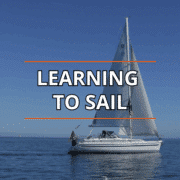Panic Is Contagious on the Water
When a riot breaks out, they say even the people who’d never normally get involved find themselves swept up in the chaos. Emotions are in a sense contagious and such feelings as panic are contagious.
The same thing happens on a boat. If the skipper panics, everyone on board feels it. And once the crew feels it, the day unravels.
Why Boating Breaks People
Boating, I’d argue, has probably caused more divorces and breakups than we care to admit. And it almost always traces back to the same root cause: the skipper wasn’t comfortable.
When you’re uncomfortable, you make panic moves. You yell at people who don’t know better. You bark orders with no explanation. You radiate tension. And if you’ve brought your spouse, your kids, or friends who are brand new to boating—what do they remember? Not the sunshine. Not the trip. They remember the yelling, the chaos, and the stress. That’s how you kill the joy of boating.
The Antidote: Education
The only real fix is education. Think about it, the more you know obviously the easier it is. When you understand what to do—whether docking or handling a sudden squall—you don’t need to yell. You don’t need to panic.
Education also makes responsibilities clear. If the crew knows what’s expected of them, there’s less room for confusion and chaos. Less yelling. More cooperation.
Confidence Is Leadership
As skipper, your primary job isn’t just steering the boat. It’s leading. Confidence is what makes people trust you. And trust is what keeps panic from spreading.
For years in my own boating career, I didn’t have that confidence. I read a few books, I learned by trial and error, but when the pressure was on—bad weather, tricky docking—I’d resort to yelling. That was insecurity talking. It wasn’t leadership.
What changed wasn’t just time on the water. It was structured education. Taking courses. Understanding how boats actually behave. Learning the theory behind the practice. Once I built that foundation, everything shifted. I could stay calm. I could communicate clearly. And boating stopped being a stress test—it became fun, for me and everyone onboard.
The Bottom Line
If you want trust from your crew, whether it’s your partner, your kids, or friends, you need confidence. And confidence doesn’t come from hope or bravado—it comes from education and competence.
Because panic is contagious. But so is calm. And as skipper, you decide which one spreads across your boat.
You can learn more with NauticEd

Sign up with NauticEd for FREE (no obligation) and receive 2 free boating courses, a free eLogbook and boating resume, and more! If you want to get started in boating or are experienced and want to expand your knowledge and skills, consider taking our many online sailing and powerboating courses.







